Sovereignty and International Law
VerifiedAdded on 2020/01/07
|8
|2551
|412
Essay
AI Summary
This assignment delves into the multifaceted concept of sovereignty within the framework of public international law. It necessitates an examination of the historical development of sovereignty, its contemporary interpretations, and the ramifications it holds for international relations. Students are expected to analyze the interplay between state sovereignty and international legal norms, exploring concepts like equality of nations, treaty obligations, and the determination of national status.
Contribute Materials
Your contribution can guide someone’s learning journey. Share your
documents today.
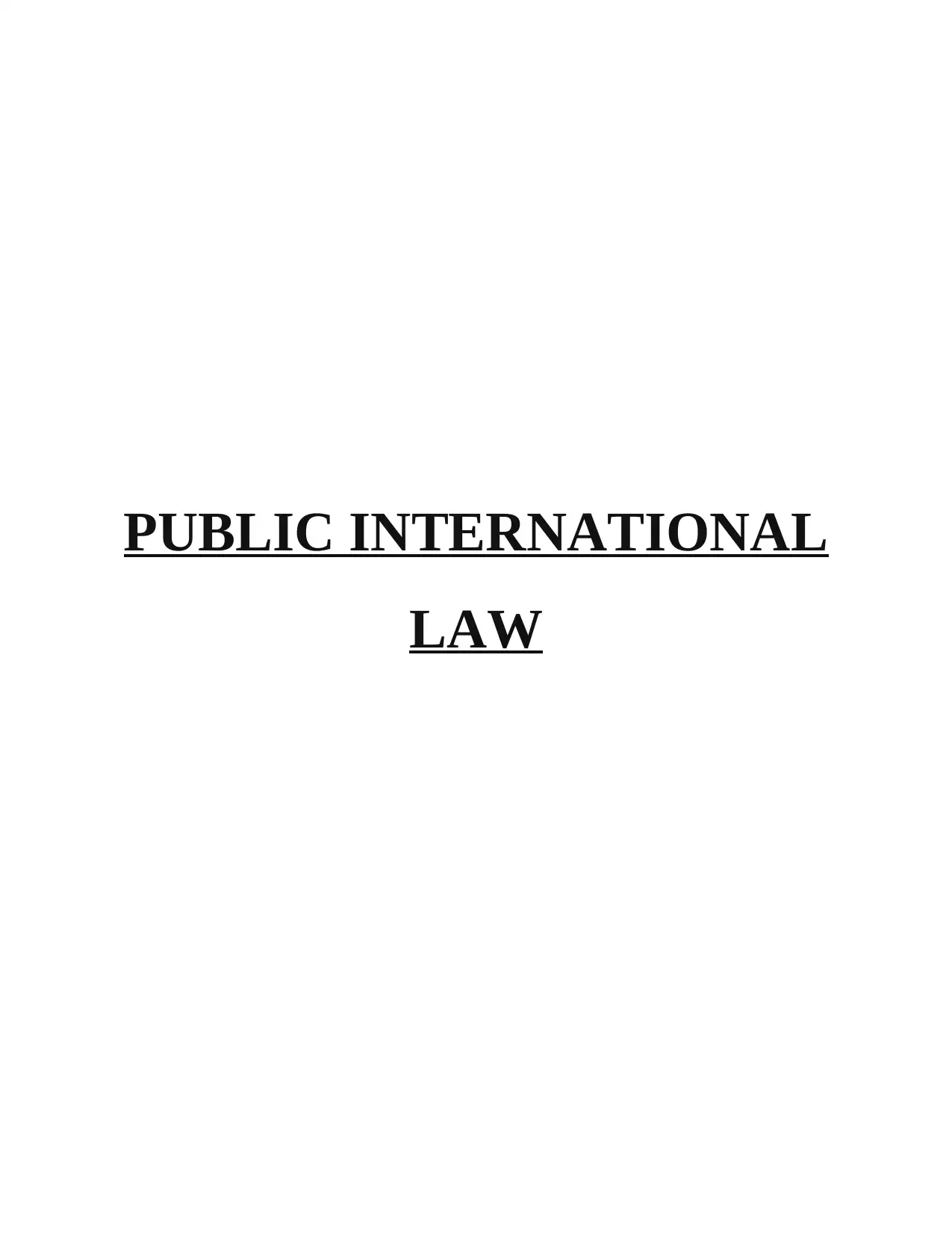
PUBLIC INTERNATIONAL
LAW
LAW
Secure Best Marks with AI Grader
Need help grading? Try our AI Grader for instant feedback on your assignments.

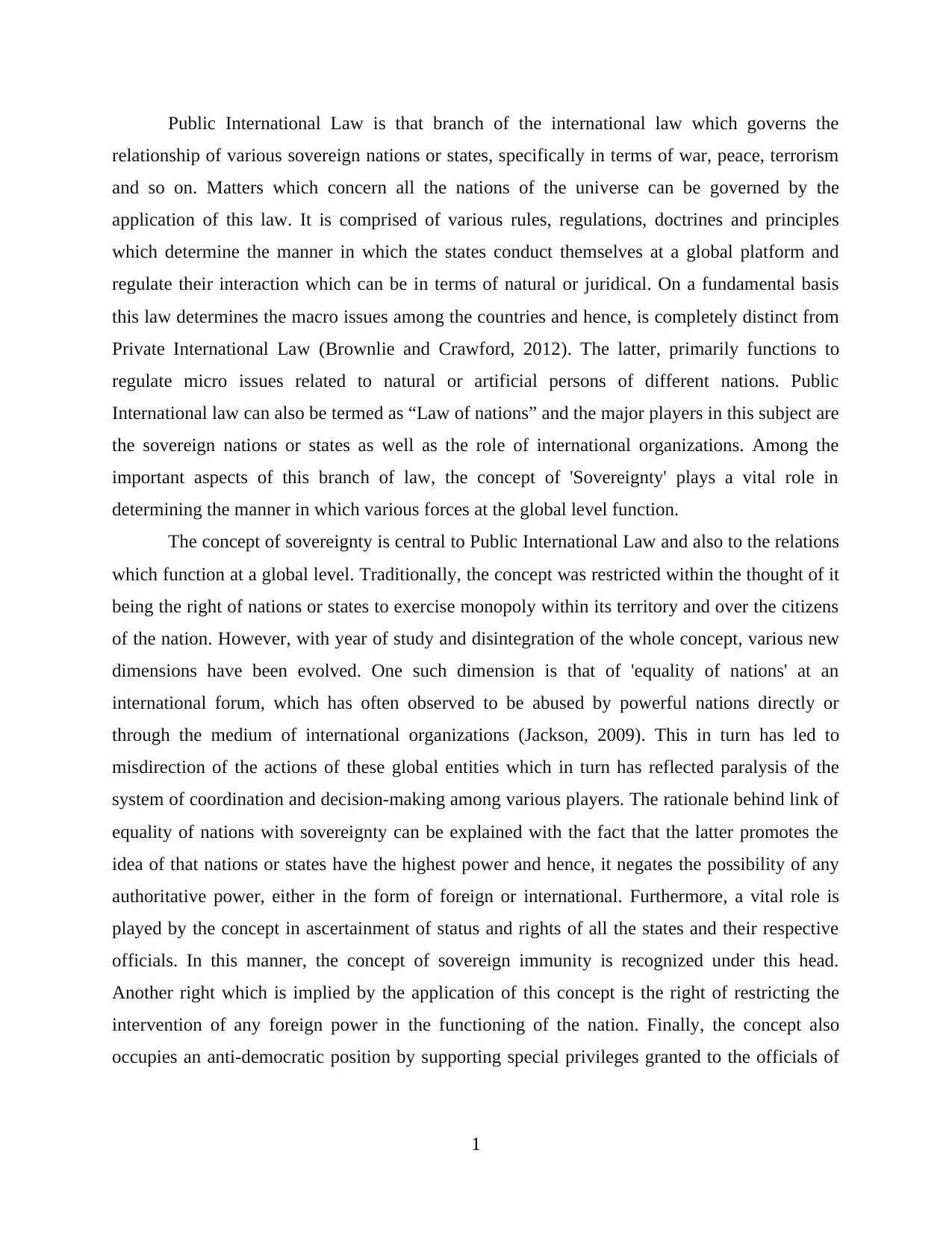
Public International Law is that branch of the international law which governs the
relationship of various sovereign nations or states, specifically in terms of war, peace, terrorism
and so on. Matters which concern all the nations of the universe can be governed by the
application of this law. It is comprised of various rules, regulations, doctrines and principles
which determine the manner in which the states conduct themselves at a global platform and
regulate their interaction which can be in terms of natural or juridical. On a fundamental basis
this law determines the macro issues among the countries and hence, is completely distinct from
Private International Law (Brownlie and Crawford, 2012). The latter, primarily functions to
regulate micro issues related to natural or artificial persons of different nations. Public
International law can also be termed as “Law of nations” and the major players in this subject are
the sovereign nations or states as well as the role of international organizations. Among the
important aspects of this branch of law, the concept of 'Sovereignty' plays a vital role in
determining the manner in which various forces at the global level function.
The concept of sovereignty is central to Public International Law and also to the relations
which function at a global level. Traditionally, the concept was restricted within the thought of it
being the right of nations or states to exercise monopoly within its territory and over the citizens
of the nation. However, with year of study and disintegration of the whole concept, various new
dimensions have been evolved. One such dimension is that of 'equality of nations' at an
international forum, which has often observed to be abused by powerful nations directly or
through the medium of international organizations (Jackson, 2009). This in turn has led to
misdirection of the actions of these global entities which in turn has reflected paralysis of the
system of coordination and decision-making among various players. The rationale behind link of
equality of nations with sovereignty can be explained with the fact that the latter promotes the
idea of that nations or states have the highest power and hence, it negates the possibility of any
authoritative power, either in the form of foreign or international. Furthermore, a vital role is
played by the concept in ascertainment of status and rights of all the states and their respective
officials. In this manner, the concept of sovereign immunity is recognized under this head.
Another right which is implied by the application of this concept is the right of restricting the
intervention of any foreign power in the functioning of the nation. Finally, the concept also
occupies an anti-democratic position by supporting special privileges granted to the officials of
1
relationship of various sovereign nations or states, specifically in terms of war, peace, terrorism
and so on. Matters which concern all the nations of the universe can be governed by the
application of this law. It is comprised of various rules, regulations, doctrines and principles
which determine the manner in which the states conduct themselves at a global platform and
regulate their interaction which can be in terms of natural or juridical. On a fundamental basis
this law determines the macro issues among the countries and hence, is completely distinct from
Private International Law (Brownlie and Crawford, 2012). The latter, primarily functions to
regulate micro issues related to natural or artificial persons of different nations. Public
International law can also be termed as “Law of nations” and the major players in this subject are
the sovereign nations or states as well as the role of international organizations. Among the
important aspects of this branch of law, the concept of 'Sovereignty' plays a vital role in
determining the manner in which various forces at the global level function.
The concept of sovereignty is central to Public International Law and also to the relations
which function at a global level. Traditionally, the concept was restricted within the thought of it
being the right of nations or states to exercise monopoly within its territory and over the citizens
of the nation. However, with year of study and disintegration of the whole concept, various new
dimensions have been evolved. One such dimension is that of 'equality of nations' at an
international forum, which has often observed to be abused by powerful nations directly or
through the medium of international organizations (Jackson, 2009). This in turn has led to
misdirection of the actions of these global entities which in turn has reflected paralysis of the
system of coordination and decision-making among various players. The rationale behind link of
equality of nations with sovereignty can be explained with the fact that the latter promotes the
idea of that nations or states have the highest power and hence, it negates the possibility of any
authoritative power, either in the form of foreign or international. Furthermore, a vital role is
played by the concept in ascertainment of status and rights of all the states and their respective
officials. In this manner, the concept of sovereign immunity is recognized under this head.
Another right which is implied by the application of this concept is the right of restricting the
intervention of any foreign power in the functioning of the nation. Finally, the concept also
occupies an anti-democratic position by supporting special privileges granted to the officials of
1
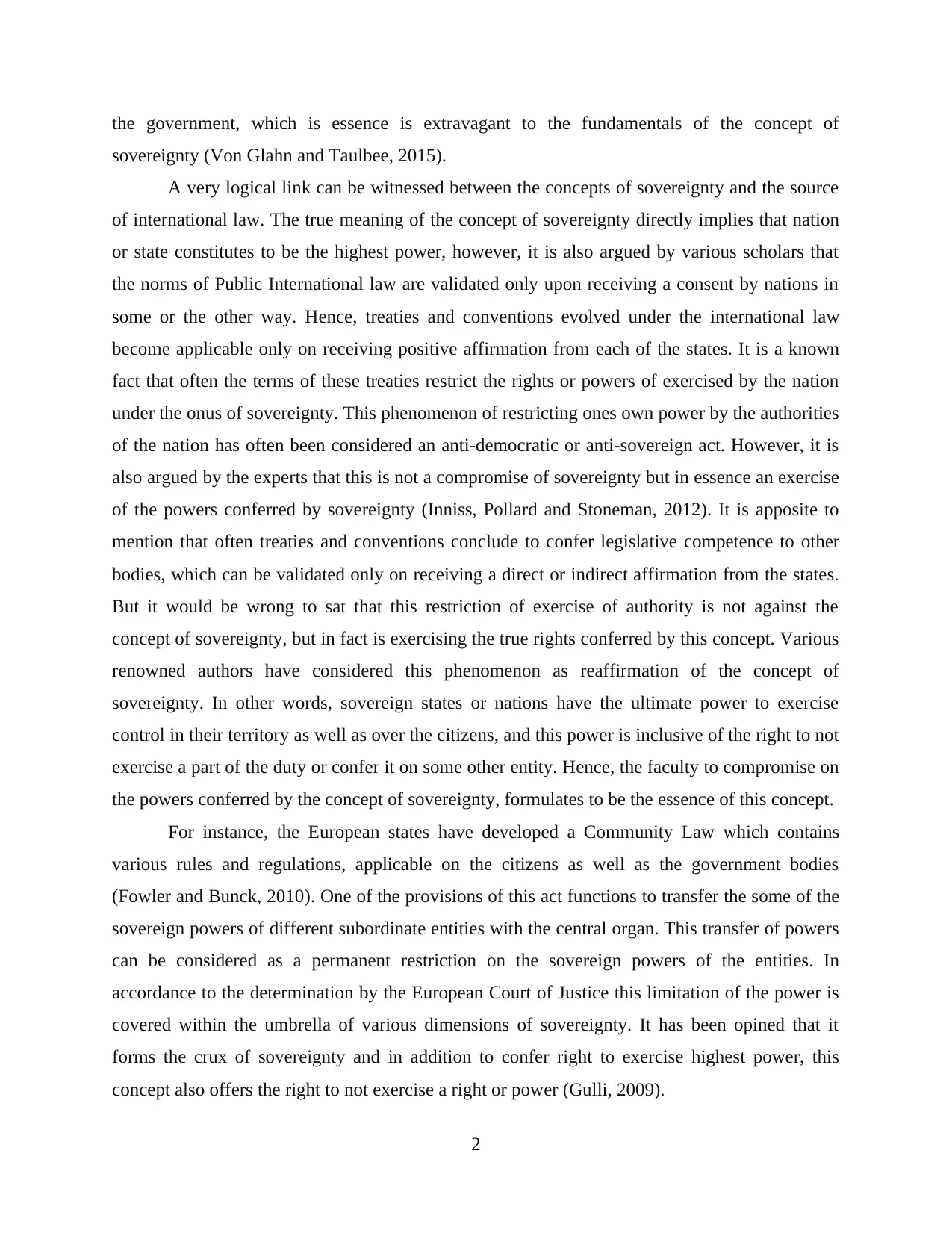
the government, which is essence is extravagant to the fundamentals of the concept of
sovereignty (Von Glahn and Taulbee, 2015).
A very logical link can be witnessed between the concepts of sovereignty and the source
of international law. The true meaning of the concept of sovereignty directly implies that nation
or state constitutes to be the highest power, however, it is also argued by various scholars that
the norms of Public International law are validated only upon receiving a consent by nations in
some or the other way. Hence, treaties and conventions evolved under the international law
become applicable only on receiving positive affirmation from each of the states. It is a known
fact that often the terms of these treaties restrict the rights or powers of exercised by the nation
under the onus of sovereignty. This phenomenon of restricting ones own power by the authorities
of the nation has often been considered an anti-democratic or anti-sovereign act. However, it is
also argued by the experts that this is not a compromise of sovereignty but in essence an exercise
of the powers conferred by sovereignty (Inniss, Pollard and Stoneman, 2012). It is apposite to
mention that often treaties and conventions conclude to confer legislative competence to other
bodies, which can be validated only on receiving a direct or indirect affirmation from the states.
But it would be wrong to sat that this restriction of exercise of authority is not against the
concept of sovereignty, but in fact is exercising the true rights conferred by this concept. Various
renowned authors have considered this phenomenon as reaffirmation of the concept of
sovereignty. In other words, sovereign states or nations have the ultimate power to exercise
control in their territory as well as over the citizens, and this power is inclusive of the right to not
exercise a part of the duty or confer it on some other entity. Hence, the faculty to compromise on
the powers conferred by the concept of sovereignty, formulates to be the essence of this concept.
For instance, the European states have developed a Community Law which contains
various rules and regulations, applicable on the citizens as well as the government bodies
(Fowler and Bunck, 2010). One of the provisions of this act functions to transfer the some of the
sovereign powers of different subordinate entities with the central organ. This transfer of powers
can be considered as a permanent restriction on the sovereign powers of the entities. In
accordance to the determination by the European Court of Justice this limitation of the power is
covered within the umbrella of various dimensions of sovereignty. It has been opined that it
forms the crux of sovereignty and in addition to confer right to exercise highest power, this
concept also offers the right to not exercise a right or power (Gulli, 2009).
2
sovereignty (Von Glahn and Taulbee, 2015).
A very logical link can be witnessed between the concepts of sovereignty and the source
of international law. The true meaning of the concept of sovereignty directly implies that nation
or state constitutes to be the highest power, however, it is also argued by various scholars that
the norms of Public International law are validated only upon receiving a consent by nations in
some or the other way. Hence, treaties and conventions evolved under the international law
become applicable only on receiving positive affirmation from each of the states. It is a known
fact that often the terms of these treaties restrict the rights or powers of exercised by the nation
under the onus of sovereignty. This phenomenon of restricting ones own power by the authorities
of the nation has often been considered an anti-democratic or anti-sovereign act. However, it is
also argued by the experts that this is not a compromise of sovereignty but in essence an exercise
of the powers conferred by sovereignty (Inniss, Pollard and Stoneman, 2012). It is apposite to
mention that often treaties and conventions conclude to confer legislative competence to other
bodies, which can be validated only on receiving a direct or indirect affirmation from the states.
But it would be wrong to sat that this restriction of exercise of authority is not against the
concept of sovereignty, but in fact is exercising the true rights conferred by this concept. Various
renowned authors have considered this phenomenon as reaffirmation of the concept of
sovereignty. In other words, sovereign states or nations have the ultimate power to exercise
control in their territory as well as over the citizens, and this power is inclusive of the right to not
exercise a part of the duty or confer it on some other entity. Hence, the faculty to compromise on
the powers conferred by the concept of sovereignty, formulates to be the essence of this concept.
For instance, the European states have developed a Community Law which contains
various rules and regulations, applicable on the citizens as well as the government bodies
(Fowler and Bunck, 2010). One of the provisions of this act functions to transfer the some of the
sovereign powers of different subordinate entities with the central organ. This transfer of powers
can be considered as a permanent restriction on the sovereign powers of the entities. In
accordance to the determination by the European Court of Justice this limitation of the power is
covered within the umbrella of various dimensions of sovereignty. It has been opined that it
forms the crux of sovereignty and in addition to confer right to exercise highest power, this
concept also offers the right to not exercise a right or power (Gulli, 2009).
2
Secure Best Marks with AI Grader
Need help grading? Try our AI Grader for instant feedback on your assignments.
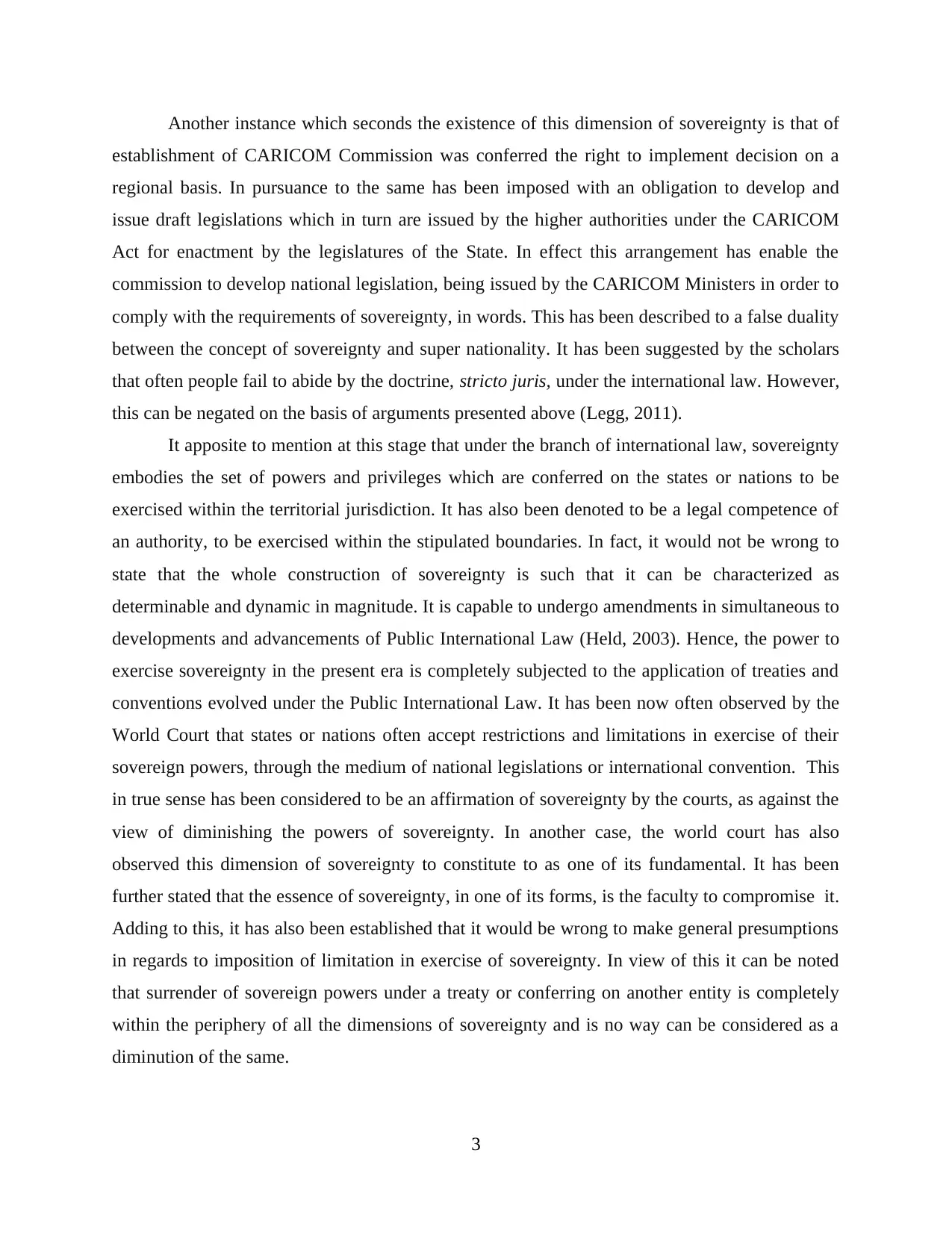
Another instance which seconds the existence of this dimension of sovereignty is that of
establishment of CARICOM Commission was conferred the right to implement decision on a
regional basis. In pursuance to the same has been imposed with an obligation to develop and
issue draft legislations which in turn are issued by the higher authorities under the CARICOM
Act for enactment by the legislatures of the State. In effect this arrangement has enable the
commission to develop national legislation, being issued by the CARICOM Ministers in order to
comply with the requirements of sovereignty, in words. This has been described to a false duality
between the concept of sovereignty and super nationality. It has been suggested by the scholars
that often people fail to abide by the doctrine, stricto juris, under the international law. However,
this can be negated on the basis of arguments presented above (Legg, 2011).
It apposite to mention at this stage that under the branch of international law, sovereignty
embodies the set of powers and privileges which are conferred on the states or nations to be
exercised within the territorial jurisdiction. It has also been denoted to be a legal competence of
an authority, to be exercised within the stipulated boundaries. In fact, it would not be wrong to
state that the whole construction of sovereignty is such that it can be characterized as
determinable and dynamic in magnitude. It is capable to undergo amendments in simultaneous to
developments and advancements of Public International Law (Held, 2003). Hence, the power to
exercise sovereignty in the present era is completely subjected to the application of treaties and
conventions evolved under the Public International Law. It has been now often observed by the
World Court that states or nations often accept restrictions and limitations in exercise of their
sovereign powers, through the medium of national legislations or international convention. This
in true sense has been considered to be an affirmation of sovereignty by the courts, as against the
view of diminishing the powers of sovereignty. In another case, the world court has also
observed this dimension of sovereignty to constitute to as one of its fundamental. It has been
further stated that the essence of sovereignty, in one of its forms, is the faculty to compromise it.
Adding to this, it has also been established that it would be wrong to make general presumptions
in regards to imposition of limitation in exercise of sovereignty. In view of this it can be noted
that surrender of sovereign powers under a treaty or conferring on another entity is completely
within the periphery of all the dimensions of sovereignty and is no way can be considered as a
diminution of the same.
3
establishment of CARICOM Commission was conferred the right to implement decision on a
regional basis. In pursuance to the same has been imposed with an obligation to develop and
issue draft legislations which in turn are issued by the higher authorities under the CARICOM
Act for enactment by the legislatures of the State. In effect this arrangement has enable the
commission to develop national legislation, being issued by the CARICOM Ministers in order to
comply with the requirements of sovereignty, in words. This has been described to a false duality
between the concept of sovereignty and super nationality. It has been suggested by the scholars
that often people fail to abide by the doctrine, stricto juris, under the international law. However,
this can be negated on the basis of arguments presented above (Legg, 2011).
It apposite to mention at this stage that under the branch of international law, sovereignty
embodies the set of powers and privileges which are conferred on the states or nations to be
exercised within the territorial jurisdiction. It has also been denoted to be a legal competence of
an authority, to be exercised within the stipulated boundaries. In fact, it would not be wrong to
state that the whole construction of sovereignty is such that it can be characterized as
determinable and dynamic in magnitude. It is capable to undergo amendments in simultaneous to
developments and advancements of Public International Law (Held, 2003). Hence, the power to
exercise sovereignty in the present era is completely subjected to the application of treaties and
conventions evolved under the Public International Law. It has been now often observed by the
World Court that states or nations often accept restrictions and limitations in exercise of their
sovereign powers, through the medium of national legislations or international convention. This
in true sense has been considered to be an affirmation of sovereignty by the courts, as against the
view of diminishing the powers of sovereignty. In another case, the world court has also
observed this dimension of sovereignty to constitute to as one of its fundamental. It has been
further stated that the essence of sovereignty, in one of its forms, is the faculty to compromise it.
Adding to this, it has also been established that it would be wrong to make general presumptions
in regards to imposition of limitation in exercise of sovereignty. In view of this it can be noted
that surrender of sovereign powers under a treaty or conferring on another entity is completely
within the periphery of all the dimensions of sovereignty and is no way can be considered as a
diminution of the same.
3
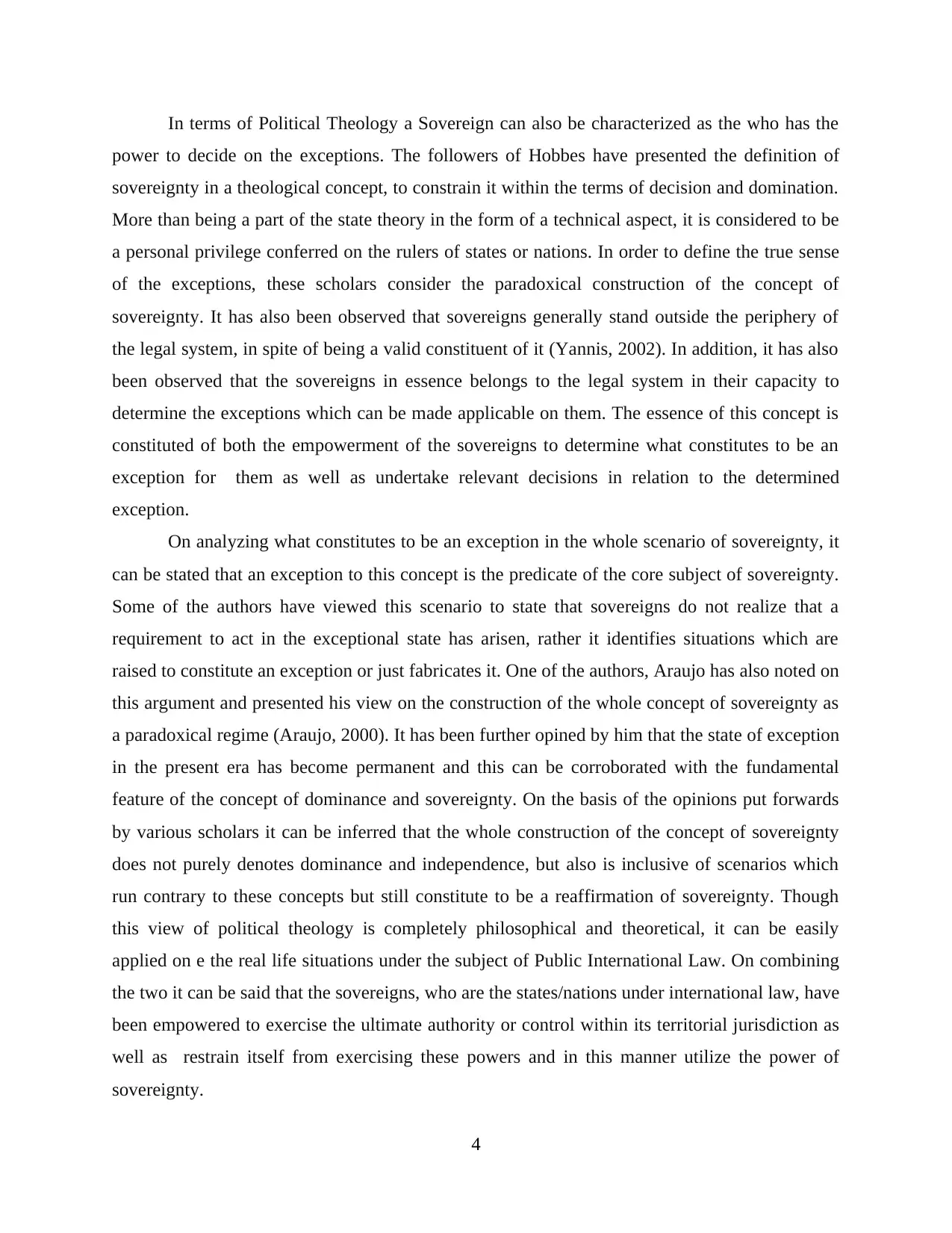
In terms of Political Theology a Sovereign can also be characterized as the who has the
power to decide on the exceptions. The followers of Hobbes have presented the definition of
sovereignty in a theological concept, to constrain it within the terms of decision and domination.
More than being a part of the state theory in the form of a technical aspect, it is considered to be
a personal privilege conferred on the rulers of states or nations. In order to define the true sense
of the exceptions, these scholars consider the paradoxical construction of the concept of
sovereignty. It has also been observed that sovereigns generally stand outside the periphery of
the legal system, in spite of being a valid constituent of it (Yannis, 2002). In addition, it has also
been observed that the sovereigns in essence belongs to the legal system in their capacity to
determine the exceptions which can be made applicable on them. The essence of this concept is
constituted of both the empowerment of the sovereigns to determine what constitutes to be an
exception for them as well as undertake relevant decisions in relation to the determined
exception.
On analyzing what constitutes to be an exception in the whole scenario of sovereignty, it
can be stated that an exception to this concept is the predicate of the core subject of sovereignty.
Some of the authors have viewed this scenario to state that sovereigns do not realize that a
requirement to act in the exceptional state has arisen, rather it identifies situations which are
raised to constitute an exception or just fabricates it. One of the authors, Araujo has also noted on
this argument and presented his view on the construction of the whole concept of sovereignty as
a paradoxical regime (Araujo, 2000). It has been further opined by him that the state of exception
in the present era has become permanent and this can be corroborated with the fundamental
feature of the concept of dominance and sovereignty. On the basis of the opinions put forwards
by various scholars it can be inferred that the whole construction of the concept of sovereignty
does not purely denotes dominance and independence, but also is inclusive of scenarios which
run contrary to these concepts but still constitute to be a reaffirmation of sovereignty. Though
this view of political theology is completely philosophical and theoretical, it can be easily
applied on e the real life situations under the subject of Public International Law. On combining
the two it can be said that the sovereigns, who are the states/nations under international law, have
been empowered to exercise the ultimate authority or control within its territorial jurisdiction as
well as restrain itself from exercising these powers and in this manner utilize the power of
sovereignty.
4
power to decide on the exceptions. The followers of Hobbes have presented the definition of
sovereignty in a theological concept, to constrain it within the terms of decision and domination.
More than being a part of the state theory in the form of a technical aspect, it is considered to be
a personal privilege conferred on the rulers of states or nations. In order to define the true sense
of the exceptions, these scholars consider the paradoxical construction of the concept of
sovereignty. It has also been observed that sovereigns generally stand outside the periphery of
the legal system, in spite of being a valid constituent of it (Yannis, 2002). In addition, it has also
been observed that the sovereigns in essence belongs to the legal system in their capacity to
determine the exceptions which can be made applicable on them. The essence of this concept is
constituted of both the empowerment of the sovereigns to determine what constitutes to be an
exception for them as well as undertake relevant decisions in relation to the determined
exception.
On analyzing what constitutes to be an exception in the whole scenario of sovereignty, it
can be stated that an exception to this concept is the predicate of the core subject of sovereignty.
Some of the authors have viewed this scenario to state that sovereigns do not realize that a
requirement to act in the exceptional state has arisen, rather it identifies situations which are
raised to constitute an exception or just fabricates it. One of the authors, Araujo has also noted on
this argument and presented his view on the construction of the whole concept of sovereignty as
a paradoxical regime (Araujo, 2000). It has been further opined by him that the state of exception
in the present era has become permanent and this can be corroborated with the fundamental
feature of the concept of dominance and sovereignty. On the basis of the opinions put forwards
by various scholars it can be inferred that the whole construction of the concept of sovereignty
does not purely denotes dominance and independence, but also is inclusive of scenarios which
run contrary to these concepts but still constitute to be a reaffirmation of sovereignty. Though
this view of political theology is completely philosophical and theoretical, it can be easily
applied on e the real life situations under the subject of Public International Law. On combining
the two it can be said that the sovereigns, who are the states/nations under international law, have
been empowered to exercise the ultimate authority or control within its territorial jurisdiction as
well as restrain itself from exercising these powers and in this manner utilize the power of
sovereignty.
4
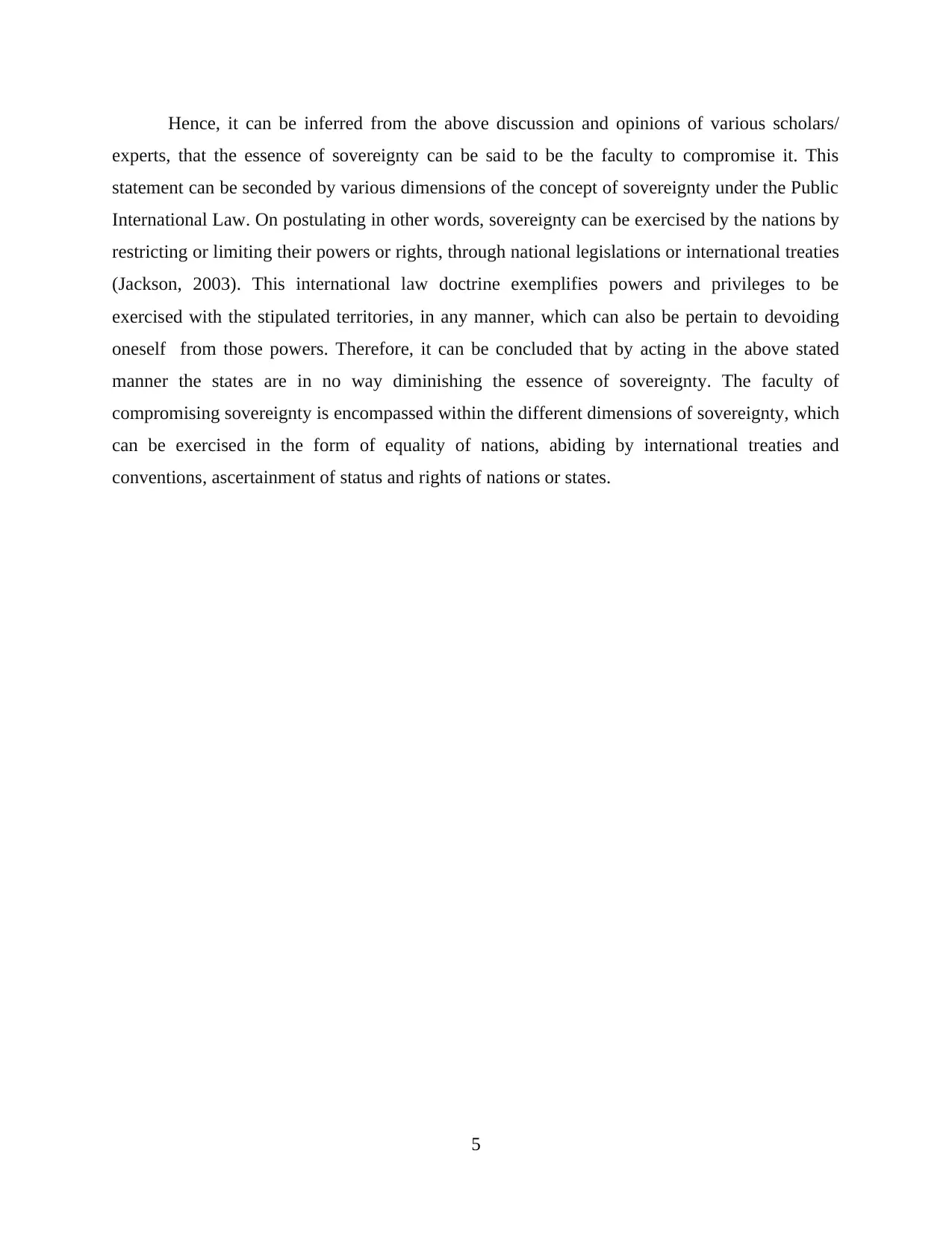
Hence, it can be inferred from the above discussion and opinions of various scholars/
experts, that the essence of sovereignty can be said to be the faculty to compromise it. This
statement can be seconded by various dimensions of the concept of sovereignty under the Public
International Law. On postulating in other words, sovereignty can be exercised by the nations by
restricting or limiting their powers or rights, through national legislations or international treaties
(Jackson, 2003). This international law doctrine exemplifies powers and privileges to be
exercised with the stipulated territories, in any manner, which can also be pertain to devoiding
oneself from those powers. Therefore, it can be concluded that by acting in the above stated
manner the states are in no way diminishing the essence of sovereignty. The faculty of
compromising sovereignty is encompassed within the different dimensions of sovereignty, which
can be exercised in the form of equality of nations, abiding by international treaties and
conventions, ascertainment of status and rights of nations or states.
5
experts, that the essence of sovereignty can be said to be the faculty to compromise it. This
statement can be seconded by various dimensions of the concept of sovereignty under the Public
International Law. On postulating in other words, sovereignty can be exercised by the nations by
restricting or limiting their powers or rights, through national legislations or international treaties
(Jackson, 2003). This international law doctrine exemplifies powers and privileges to be
exercised with the stipulated territories, in any manner, which can also be pertain to devoiding
oneself from those powers. Therefore, it can be concluded that by acting in the above stated
manner the states are in no way diminishing the essence of sovereignty. The faculty of
compromising sovereignty is encompassed within the different dimensions of sovereignty, which
can be exercised in the form of equality of nations, abiding by international treaties and
conventions, ascertainment of status and rights of nations or states.
5
Paraphrase This Document
Need a fresh take? Get an instant paraphrase of this document with our AI Paraphraser
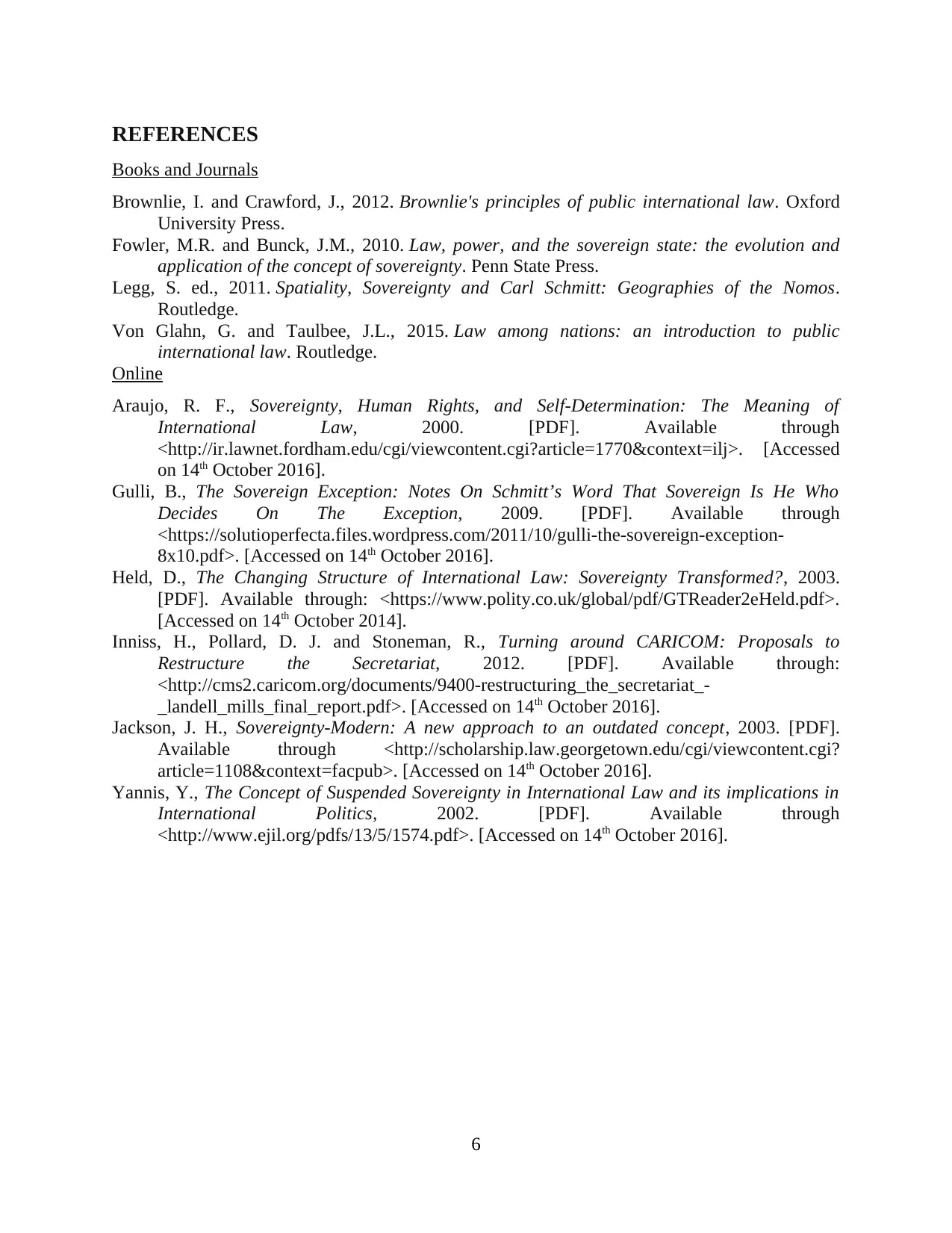
REFERENCES
Books and Journals
Brownlie, I. and Crawford, J., 2012. Brownlie's principles of public international law. Oxford
University Press.
Fowler, M.R. and Bunck, J.M., 2010. Law, power, and the sovereign state: the evolution and
application of the concept of sovereignty. Penn State Press.
Legg, S. ed., 2011. Spatiality, Sovereignty and Carl Schmitt: Geographies of the Nomos.
Routledge.
Von Glahn, G. and Taulbee, J.L., 2015. Law among nations: an introduction to public
international law. Routledge.
Online
Araujo, R. F., Sovereignty, Human Rights, and Self-Determination: The Meaning of
International Law, 2000. [PDF]. Available through
<http://ir.lawnet.fordham.edu/cgi/viewcontent.cgi?article=1770&context=ilj>. [Accessed
on 14th October 2016].
Gulli, B., The Sovereign Exception: Notes On Schmitt’s Word That Sovereign Is He Who
Decides On The Exception, 2009. [PDF]. Available through
<https://solutioperfecta.files.wordpress.com/2011/10/gulli-the-sovereign-exception-
8x10.pdf>. [Accessed on 14th October 2016].
Held, D., The Changing Structure of International Law: Sovereignty Transformed?, 2003.
[PDF]. Available through: <https://www.polity.co.uk/global/pdf/GTReader2eHeld.pdf>.
[Accessed on 14th October 2014].
Inniss, H., Pollard, D. J. and Stoneman, R., Turning around CARICOM: Proposals to
Restructure the Secretariat, 2012. [PDF]. Available through:
<http://cms2.caricom.org/documents/9400-restructuring_the_secretariat_-
_landell_mills_final_report.pdf>. [Accessed on 14th October 2016].
Jackson, J. H., Sovereignty-Modern: A new approach to an outdated concept, 2003. [PDF].
Available through <http://scholarship.law.georgetown.edu/cgi/viewcontent.cgi?
article=1108&context=facpub>. [Accessed on 14th October 2016].
Yannis, Y., The Concept of Suspended Sovereignty in International Law and its implications in
International Politics, 2002. [PDF]. Available through
<http://www.ejil.org/pdfs/13/5/1574.pdf>. [Accessed on 14th October 2016].
6
Books and Journals
Brownlie, I. and Crawford, J., 2012. Brownlie's principles of public international law. Oxford
University Press.
Fowler, M.R. and Bunck, J.M., 2010. Law, power, and the sovereign state: the evolution and
application of the concept of sovereignty. Penn State Press.
Legg, S. ed., 2011. Spatiality, Sovereignty and Carl Schmitt: Geographies of the Nomos.
Routledge.
Von Glahn, G. and Taulbee, J.L., 2015. Law among nations: an introduction to public
international law. Routledge.
Online
Araujo, R. F., Sovereignty, Human Rights, and Self-Determination: The Meaning of
International Law, 2000. [PDF]. Available through
<http://ir.lawnet.fordham.edu/cgi/viewcontent.cgi?article=1770&context=ilj>. [Accessed
on 14th October 2016].
Gulli, B., The Sovereign Exception: Notes On Schmitt’s Word That Sovereign Is He Who
Decides On The Exception, 2009. [PDF]. Available through
<https://solutioperfecta.files.wordpress.com/2011/10/gulli-the-sovereign-exception-
8x10.pdf>. [Accessed on 14th October 2016].
Held, D., The Changing Structure of International Law: Sovereignty Transformed?, 2003.
[PDF]. Available through: <https://www.polity.co.uk/global/pdf/GTReader2eHeld.pdf>.
[Accessed on 14th October 2014].
Inniss, H., Pollard, D. J. and Stoneman, R., Turning around CARICOM: Proposals to
Restructure the Secretariat, 2012. [PDF]. Available through:
<http://cms2.caricom.org/documents/9400-restructuring_the_secretariat_-
_landell_mills_final_report.pdf>. [Accessed on 14th October 2016].
Jackson, J. H., Sovereignty-Modern: A new approach to an outdated concept, 2003. [PDF].
Available through <http://scholarship.law.georgetown.edu/cgi/viewcontent.cgi?
article=1108&context=facpub>. [Accessed on 14th October 2016].
Yannis, Y., The Concept of Suspended Sovereignty in International Law and its implications in
International Politics, 2002. [PDF]. Available through
<http://www.ejil.org/pdfs/13/5/1574.pdf>. [Accessed on 14th October 2016].
6
1 out of 8
Related Documents
Your All-in-One AI-Powered Toolkit for Academic Success.
+13062052269
info@desklib.com
Available 24*7 on WhatsApp / Email
![[object Object]](/_next/static/media/star-bottom.7253800d.svg)
Unlock your academic potential
© 2024 | Zucol Services PVT LTD | All rights reserved.





